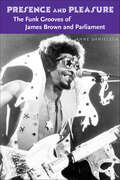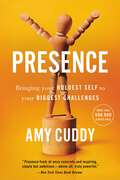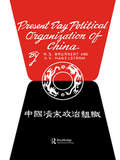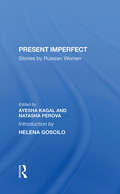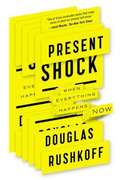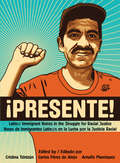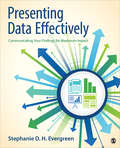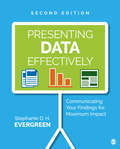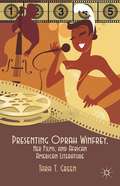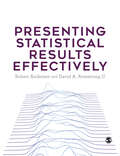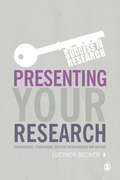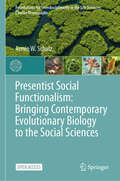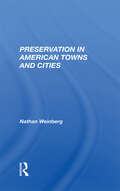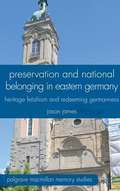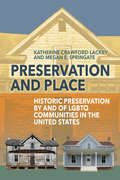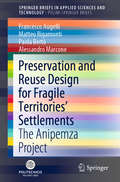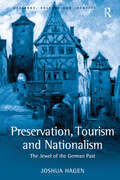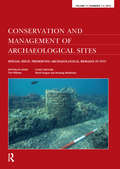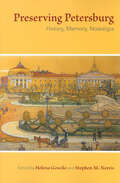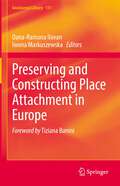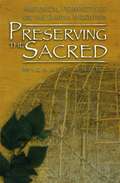- Table View
- List View
Presence and Pleasure: The Funk Grooves of James Brown and Parliament
by Anne DanielsenWinner of the 2007 Irving Lowens Book Award from the Society for American MusicWinner of IASPM's 2007 International Book AwardIn this exploration of the funk groove and its unique sounds, author Anne Danielsen takes an in-depth look at this under-explored genre. Danielsen concentrates on the golden age of funk in the late 1960s and the 1970s, focusing on two of the era's artists who made a substantial impact on the landscape of popular music: James Brown and George Clinton/Parliament. Aiming to understand funk not only as objectified musical meaning but also as lived experience, she begins with the musical events themselves and draws on her experiences as both a fan and a scholar to capture how their particular organization creates the funk listener's pleasure. Danielsen further examines issues surrounding race in the construction and consumption of this music, focusing her study with how white listeners responded to funk in the 1970s, and arguing that African American music has remained a means of catharsis and of dealing with pleasures of the body. Funk's crossover to international success among listeners of pop and rock music affected both the music itself and audiences' understanding of it. Presence and Pleasure shows us how.
Presence: Bringing Your Boldest Self to Your Biggest Challenges
by Amy CuddyHave you ever left a nerve-racking challenge and immediately wished for a do over? Maybe after a job interview, a performance, or a difficult conversation? The very moments that require us to be genuine and commanding can instead cause us to feel phony and powerless. Too often we approach our lives' biggest hurdles with dread, execute them with anxiety, and leave them with regret. By accessing our personal power, we can achieve "presence," the state in which we stop worrying about the impression we're making on others and instead adjust the impression we've been making on ourselves. As Harvard professor Amy Cuddy's revolutionary book reveals, we don't need to embark on a grand spiritual quest or complete an inner transformation to harness the power of presence. Instead, we need to nudge ourselves, moment by moment, by tweaking our body language, behavior, and mind-set in our day-to-day lives. Amy Cuddy has galvanized tens of millions of viewers around the world with her TED talk about "power poses." Now she presents the enthralling science underlying these and many other fascinating body-mind effects, and teaches us how to use simple techniques to liberate ourselves from fear in high-pressure moments, perform at our best, and connect with and empower others to do the same. Brilliantly researched, impassioned, and accessible, Presence is filled with stories of individuals who learned how to flourish during the stressful moments that once terrified them. Every reader will learn how to approach their biggest challenges with confidence instead of dread, and to leave them with satisfaction instead of regret.
Present Day Political Organization of China
by H.S. Brunnert V.V. HagelstromOriginally published in 1910, this work presents a fascinating insight into the government and administration of the China of the day. The period was one of immense change as China's leaders turned the nation towards modernity. As student interpreters to the Imperial Russian Legation, the authors had privileged access to the corridors of power and found themselves very much at the heart of the republican ferment that gripped the country.
Present Imperfect: Stories By Russian Women
by Natasha Perova Ayesha KagalThe selections in this Anthology overturn Soviet-era taboos with a vengeance. First published in the aftermath of Mikhail Gorbachev's liberalizing reforms, these stories revel in the basic commonalities of human experience even as they reassert a peculiarly Russian belief in the spiritual, mystical, and supernatural. They satirize Soviet literary canons while exploring a full gamut of styles, from neorealism to magico-folkloric fantasy. Included in the volume are works by well-known pioneers of the "new women's prose" as well as by less familiar talents. Bold in thematic conception and stylistic experimentation, their stories are socially engaged–in the classic Russian literary tradition–and yet at the same time intensely personal. While many of these writers share a feminist outlook, their perspectives are vastly disparate and often steeped in a peculiarly post-Soviet irony: In one story, for example, a girl with no money and no prospects of earning any turns to prostitution–and fails because of her lack of entrepreneurial talent. Yet common to all are recurrent and interwoven motifs of self-discovery, sexual power, emotional attachment, social alienation, and vulnerability to uncontrollable forces. The ambiguous ways in which these themes are played out reveal much about what has changed and what remains at the core of a complex culture in transition.
Present Shock
by Douglas RushkoffPeople spent the twentieth century obsessed with the future. We created technologies that would help connect us faster, gather news, map the planet, and compile knowledge. We strove for an instantaneous network where time and space could be compressed. Well, the future's arrived. We live in a continuous now enabled by Twitter, email, and a so-called real-time technological shift. Yet this "now" is an elusive goal that we can never quite reach. And the dissonance between our digital selves and our analog bodies has thrown us into a new state of anxiety: present shock. Douglas Rushko weaves together seemingly disparate events and trends into a rich, nuanced portrait of how life in the eternal present has affected our biology, behavior, politics, and culture. "Invaluable." -- The New York Times "This is a wondrously thought-provoking book." -- Walter Isaacson "A sobering wake-up call to collectively reexamine our relationship with time before we're blindsided by an unwelcome future." --Booklist
Present Shock
by Douglas RushkoffPeople spent the twentieth century obsessed with the future. We created technologies that would help connect us faster, gather news, map the planet, and compile knowledge. We strove for an instantaneous network where time and space could be compressed. Well, the future's arrived. We live in a continuous now enabled by Twitter, email, and a so-called real-time technological shift. Yet this "now" is an elusive goal that we can never quite reach. And the dissonance between our digital selves and our analog bodies has thrown us into a new state of anxiety: present shock.
Presente!: Latin@ Immigrant Voices in the Struggle for Racial Justice / Voces Inmigranted Latinas en la Lucha por la Justicia Racial
by Juan González Arnulfo Manríquez Cristina Tzintzún Carlos Pérez de AlejoRead the media coverage of the increasingly heated debate around immigration reform in the United States: two dominant narratives emerge. From Lou Dobbs to Sean Hannity, commentators on the right have crafted an image rooted in fear, demonizing undocumented immigrants as a threat to national security and raising the specter of a deliberate "browning of America." Left-leaning journalists, on the other hand, foreground victimization, emphasizing the plight of immigrants, stripping them of their agency. Neither captures the range of experiences within undocumented immigrant communities, and both fail to see immigrants as active participants in their own struggle for racial and economic justice.Presente! offers a rare perspective on the immigrant-rights movement, written by immigrant workers themselves. Including a range of essays exploring the intersection of race, class, and immigration in the United States, this anthology challenges its readers to move beyond a "legalization-only" framework and embrace a broader vision for social justice organizing embodied in the work of grassroots organizations across the country resisting state repression, cultivating solidarity, and building alternative models for progressive social change. Offered in a dual-language edition, with a foreword by Democracy Now! co-host Juan Gonzáles.Cristina Tzintzún is the executive director of Workers Defense Project, a Texas based workers' rights organization.Carlos Pérez de Alejo is the executive director of Cooperation Texas, an organization dedicated to the creation of sustainable jobs through the development, support, and promotion of worker-owned cooperatives.Arnulfo Manríquez is an organizer at Workers Defense Project, where he organizes immigrant construction workers to defend their labor and human rights.
Presenting Data Effectively: Communicating Your Findings for Maximum Impact
by Dr Stephanie D. EvergreenMake an impact with your research data! Focusing on the guiding principles of presenting data in evidence-based ways so that audiences are effectively engaged and researchers are better understood, Presenting Data Effectively offers the best communication strategies available to those working with data. With this accessible step-by-step guide, anyone—from students developing a research poster for a school project to faculty and researchers presenting data at a conference—can learn how to present and communicate their research findings in more interesting and effective ways. Author Stephanie Evergreen draws on her extensive experience in the study of research reporting, interdisciplinary evaluation, and data visualization, as well as from diverse interdisciplinary fields, including cognitive psychology, communications, and graphic design, to extract tangible and practical data-reporting communication lessons and insights. She then demonstrates how to apply those principles to the design of data presentations to make it easier for the audience to understand, remember, and use the data.
Presenting Data Effectively: Communicating Your Findings for Maximum Impact
by Dr Stephanie EvergreenNow in striking full color, Presenting Data Effectively, Second Edition by Stephanie D. H. Evergreen shows readers how to make the research results presented in reports, slideshows, dashboards, posters, and data visualizations more interesting, engaging, and impactful. The book guides students, researchers, evaluators, and non-profit workers—anyone reporting data to an outside audience—through design choices in four primary areas: graphics, text, color, and arrangement. The Second Edition features an improved layout with larger screenshots, a review of the recent literature on data visualization, and input from a panel of graphic design experts.
Presenting Data Effectively: Communicating Your Findings for Maximum Impact
by Stephanie Evergreen<p>Now in striking full color, <i>Presenting Data Effectively, Second Edition</i> by Stephanie D. H. Evergreen shows readers how to make the research results presented in reports, slideshows, dashboards, posters, and data visualizations more interesting, engaging, and impactful. <p>The book guides students, researchers, evaluators, and non-profit workers—anyone reporting data to an outside audience—through design choices in four primary areas: graphics, text, color, and arrangement. The Second Edition features an improved layout with larger screenshots, a review of the recent literature on data visualization, and input from a panel of graphic design experts.</p>
Presenting Oprah Winfrey, Her Films, and African American Literature
by Tara T. GreenOprah Winfrey has long promoted black issues by being involved as a producer or actor in the adaptation of works by African American writers for film. This volume evaluates Winfrey's involvement in the visual interpretation of African American literary texts using film, music, black masculinity, black feminist, and cultural theory.
Presenting Statistical Results Effectively
by Robert Andersen David A. Armstrong IIPerfect for any statistics student or researcher, this book offers hands-on guidance on how to interpret and discuss your results in a way that not only gives them meaning, but also achieves maximum impact on your target audience. No matter what variables your data involves, it offers a roadmap for analysis and presentation that can be extended to other models and contexts. Focused on best practices for building statistical models and effectively communicating their results, this book helps you: - Find the right analytic and presentation techniques for your type of data - Understand the cognitive processes involved in decoding information - Assess distributions and relationships among variables - Know when and how to choose tables or graphs - Build, compare, and present results for linear and non-linear models - Work with univariate, bivariate, and multivariate distributions - Communicate the processes involved in and importance of your results.
Presenting Statistical Results Effectively
by Robert Andersen David A. Armstrong IIPerfect for any statistics student or researcher, this book offers hands-on guidance on how to interpret and discuss your results in a way that not only gives them meaning, but also achieves maximum impact on your target audience. No matter what variables your data involves, it offers a roadmap for analysis and presentation that can be extended to other models and contexts. Focused on best practices for building statistical models and effectively communicating their results, this book helps you: - Find the right analytic and presentation techniques for your type of data - Understand the cognitive processes involved in decoding information - Assess distributions and relationships among variables - Know when and how to choose tables or graphs - Build, compare, and present results for linear and non-linear models - Work with univariate, bivariate, and multivariate distributions - Communicate the processes involved in and importance of your results.
Presenting Your Research: Conferences, Symposiums, Poster Presentations and Beyond (Success in Research)
by Lucinda BeckerFor many researchers, the need to present relevant and engaging material in the most effective way in an unfamiliar setting presents a potential barrier to their success as professionals. This handy guide tackles the obstacles to effective and successful presentations, considering the range of material which might be presented, the occasions which suit different types of material and the skills needed to present research in a way that is engaging and persuasive. This book addresses questions such as: Why should I give a paper and where might I give a paper? How does the conference system works? How do I prepare an abstract/outline/synopsis? How do I chose my material and prepare it for a conference presentation? How can I prepare effective conference aids? How can I overcome my nerves? How can I prepare and present effective posters for poster presentations? As with the other titles in the Success in Research series, this guide takes a hands-on approach and includes checklists, top tips, exercises and examples to help you remember what you have read and put it immediately to work! The Success in Research series, from Cindy Becker and Pam Denicolo, provides short, authoritative and accessible guides on key areas of professional and research development. Avoiding jargon and cutting to the chase of what you really need to know, these practical and supportive books cover a range of areas from presenting research to achieving impact, and from publishing journal articles to developing proposals. They are essential reading for any student or researcher interested in developing their skills and broadening their professional and methodological knowledge in an academic context.
Presentist Social Functionalism: Bringing Contemporary Evolutionary Biology to the Social Sciences (Foundations for Interdisciplinarity in the Life Sciences: Concise Monographs)
by Armin W. SchulzThis open access book presents and defends a new approach towards social functionalism: Presentist Social Functionalism. This approach draws on recent developments in evolutionary biology and philosophy of biology to provide a more compelling theoretical foundation for functionalist social analysis. Functionalist approaches to the social sciences—which aim at using facts about what social institutions are for to provide a fulcrum with which to understand, evaluate, and respond to social reality—are about as old as the subject itself, but have also been the subject of much criticism. In particular, a widespread concern for the functionalist tradition in the social sciences is that functional ascriptions often lack a plausible theoretical grounding, and that where such a theoretical grounding can be provided, the empirical presuppositions of this grounding often fail to be met. However, recent developments in evolutionary biology and the philosophy of biology promise to change this situation: they show that functional ascription can be compellingly made in an ahistorical, non-reproduction-based, and non-normative manner, which makes it possible to develop a new account of social functionalism that can fulfil the latter&’s theoretical and empirical desiderata. To show this, the book begins by laying out the major existing accounts of social functionalism and detailing their challenges. It then develops the new, alternative account of Presentist Social Functionalism. Given its interdisciplinary nature and application-focused approach, the book is of interest to researchers in a variety of fields, from evolutionary biology to the social sciences and philosophy.
Preservation In American Towns And Cities
by Nathan Gerald WeinbergThis book provides a glimpse of what has happened in the preservation movement in 130 years, from the lawns of Mount Vernon to the row houses of Mount Auburn. It discusses the need to continue refining standards, identifying weaknesses, and extolling excellence in the marketplace of preservation.
Preservation and National Belonging in Eastern Germany
by Jason JamesDrawing on cultural anthropology and cultural studies, this book sheds new light on the everyday politics of heritage and memory by illuminating local, everyday engagements with Germanness through heritage fetishism, claims to hometown belonging, and the performative appropriation of cultural property.
Preservation and Place: Historic Preservation by and of LGBTQ Communities in the United States
by Katherine Crawford-Lackey Megan E. SpringateSignificant historic and archaeological sites affiliated with two-sprit, lesbian, gay, bisexual, transgender, and queer history in the United States are examined in this unique volume. The importance of the preservation process in documenting and interpreting the lives and experiences of queer Americans is emphasized. The book features chapters on archaeology and interpretation, as well as several case studies focusing on queer preservation projects. The accessible text and associated activities create an interactive and collaborative process that encourages readers to apply the material in a hands-on setting.
Preservation and Reuse Design for Fragile Territories’ Settlements: The Anipemza Project (SpringerBriefs in Applied Sciences and Technology)
by Francesco Augelli Matteo Rigamonti Paola Bertò Alessandro MarconeThis book reports on an architectural conservation and reuse project in Anipemza, an Armenian Soviet-era village on the Turkish border, just a few steps away from the important Yererouyk archaeological site. Based on current tourist trends, the book suggests the development of a social system and micro-economic reactivation model to endorse the territory’s numerous cultural resources and preserve the memory of the village that housed the genocide orphanages and the many other stories associated with the village. Further, the development of sustainable tourism will lead to an improved relationship between locals and visitors. Examining the development of a system of strategies able to cope with the existing social, economic and hygiene problems as well as the architectural preservation aims, the book provides valuable guidelines for the local community.
Preservation of Affordable Rental Housing: Evaluation of the MacArthur Foundation's Window of Opportunity Initiative
by Lois M. Davis Catherine H. Augustine Heather L. Schwartz Vincent J. Reina Richard K. Green Raphael W. BosticIn 2000, the MacArthur Foundation began the Window of Opportunity, a 20-year, $187 million philanthropic initiative intended to help preserve privately owned affordable rental housing. The authors of this report assess whether the initiative achieved its goals and identify lessons learned about effective preservation practices, as well as about the implementation of large-scale philanthropic initiatives generally.
Preservation, Tourism and Nationalism: The Jewel of the German Past (Heritage, Culture and Identity)
by Joshua HagenSince its discovery by German romantics and nationalists, Rothenburg has been an established icon of the German nation and its medieval past. By tracing Rothenburg's historical development as a place of national importance, this book examines the cultural politics of historical preservation and tourism in general. In exploring the shifting practice and importance of tourism in Rothenburg and how this relates to broader debates about German culture and identity, Preservation, Tourism and Nationalism offers an important and original perspective on the changing dynamics of romanticized historical landscapes and how events are used to further national, cultural and political agendas. It also analyses the changing practices of historical preservation, and in particular, how historic preservation in Rothenburg reflects a desire to make it more historic and more German. With important insights into what it means to be German, how Germans relate to the past and how the answers to these questions have changed over time, this richly illustrated and detailed volume offers an important narrative of the rise, evolution and contestation of memory in German culture.
Preserving Archaeological Remains in Situ: Proceedings of the 4th International Conference
by David GregoryThe PARIS 4 conference, which took place at the National Museum of Denmark in 2011, attracted over 100 participants from 18 countries. Delegates presented and discussed the latest developments in the field of Preserving Archaeological Remains In Situ. These proceedings explore four major themes: rates of degradation in archaeological remains and the limits of acceptable change; the techniques and duration of monitoring on archaeological sites; the role of multinational standards when the sites and national legislations are so variable; reviewing the effectiveness of in situ preservation, after nearly two decades of research. A special issue of Conservation and Management of Archaeological Sites (Vol 14 Nos 1-4).
Preserving Petersburg: History, Memory, Nostalgia
by Helena Goscilo and Stephen M. Norris“Goscilo and Norris’ innovative anthology provides Slavic scholars with a panoramic view of the city’s literary, pictorial and social manifestations.” —Europe-Asia StudiesFor more than three centuries, St. Petersburg, founded in 1703 by Peter the Great as Russia’s westward-oriented capital and as a visually stunning showcase of Russia’s imperial ambitions, has been the country’s most mythologized city. Like a museum piece, it has functioned as a site for preservation, a literal and imaginative place where Russians can commune with idealized pasts. Preserving Petersburg represents a significant departure from traditional representations. By moving beyond the “Petersburg text” created by canonized writers and artists, the contributors to this engrossing volume trace the ways in which St. Petersburg has become a “museum piece,” embodying history, nostalgia, and recourse to memories of the past. The essays in this attractively illustrated volume trace a process of preservation that stretches back nearly three centuries, as manifest in the works of noted historians, poets, novelists, artists, architects, filmmakers, and dramatists.“The collection truly sparkles as the contributors each in turn take up this snuff box of a city . . . and breathe movement and life into the idealized Petersburg museum.” —Gregory Stroud, Bennington College“This collection brings together history, literature, architecture, and the politics of memory.” —Choice“An interesting and important contribution to existing scholarship on St. Petersburg’s myth, cult, and text . . . this volume is distinctive.” —Catharine Theimer Nepomnyashchy, Columbia University“A truly innovative contribution to the scholarship on Petersburg . . . The volume should be read by all serious Slavic scholars.” —Emily Johnson, University of Oklahoma
Preserving and Constructing Place Attachment in Europe (GeoJournal Library #131)
by Oana-Ramona Ilovan Iwona MarkuszewskaThis book offers a variety of theoretical and methodological approaches to place attachment from a European perspective. Starting from a dynamic, relational, and participatory concept of place attachment, the book discusses place making and place attachment processes through place-based development and community place-driven actions. It also presents examples of creating place attachment through nature- and culture-based contexts and focuses on how sustainable planning and territorial identities enhance place attachment. Finally, this book presents and discusses (re)constructing place attachment within transition processes and through strategic solutions for urban recovery and regeneration of (post)-industrial areas. By considering the social, environmental, economic, and political effects of building, strengthening and maintaining place attachment, this book is a valuable read for all those working with and interested in learning more about place attachment: geographers, landscape planners, sociologists, psychologists, environmental and political scientists, and members of community movements.
Preserving the Sacred: Historical Perspectives on the Ojibwa Midewiwin (Manitoba Studies in Native History #13)
by Michael AngelThe Midewiwin is the traditional religious belief system central to the world view of Ojibwa in Canada and the US. It is a highly complex and rich series of sacred teachings and narratives whose preservation enabled the Ojibwa to withstand severe challenges to their entire social fabric throughout the 19th and 20th centuries. It remains an important living and spiritual tradition for many Aboriginal people today.The rituals of the Midewiwin were observed by many 19th century Euro-Americans, most of whom approached these ceremonies with hostility and suspicion. As a result, although there were many accounts of the Midewiwin published in the 19th century, they were often riddled with misinterpretations and inaccuracies.Historian Michael Angel compares the early texts written about the Midewiwin, and identifies major, common misconceptions in these accounts. In his explanation of the historical role played by the Midewiwin, he provides alternative viewpoints and explanations of the significance of the ceremonies, while respecting the sacred and symbolic nature of the Midewiwin rituals, songs, and scrolls.
